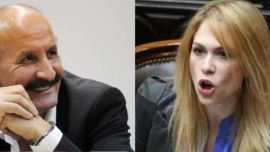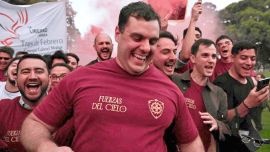President Alberto Fernández announced a dramatic tightening of measures to tackle the spread of Covid-19 on Wednesday, as fears over the nation’s health system escalated.
In a nationwide address, the Peronist leader told Argentines that he was extending the hours of an existing nighttime curfew, further restricting business hours and ordering the closure of schools in the Buenos Aires Metropolitan Area until the end of April.
The move, which comes after a surge in infections, the so-called ‘second wave,’ was made hours after the Health Ministry confirmed 25,157 cases and 368 deaths over the last 24 hours. More than 2.6 million people have now been infected in Argentina since the start of the pandemic, with 58,542 fatalities.
The president’s announcement was met with fierce criticism from the opposition and a cacerolazo pot-banging protest in and around Buenos Aires. Much of the anger focused on the decision to suspend face-to face classes at schools, though rival politicians also criticised the economic impact of the restrictions.
Adding to the confusion, just hours before the announcement, Education Minister Nicolás Trotta had told a meeting of the Federal Education Council that any restrictions "should not imply the absolute suspension of classes in classrooms as a first measure."
The new rules were announced after a summit at Olivos involving Fernández, Cabinet Chief Santiago Cafiero and Health Minister Carla Vizzotti.
In recent days, fears have grown over the surge in infections, while expert medical advisors to the Casa Rosada warned that the health system was under increasing strain, especially in the AMBA region.
Measures
Fernández said that, as from Friday, the existing nighttime curfew would be extended from 8pm to 6am for those not considered essential workers, with business hours restricted to 10 hours between 9am and 7pm, including restaurants and bars, which can only remain open afterwards for home delivery.
In the Buenos Aires Metropolitan Area (AMBA), in-person classes at all three educational levels will be suspended for the next two weeks as from Monday, he added, with all learning to be completed virtually until the end of April.
All recreational, social, cultural, sports and religious activities in closed places are to be suspended in the region, he added.
The president said that AMBA had been picked out as the region “constitutes a single urban agglomeration” which is “one of the most populated areas in the Americas." High population density creates better conditions for the virus to spread quicker, he argued.
Covid-19 in surging in Argentina, with officials recording significantly more cases than a month ago. Over the past week, daily caseloads have regularly topped 20,000 (with a high of 27,001) compared to 6,000 on average in March.
Fernández, who on Wednesday was given the all-clear by doctors after contracting Covid-19, despite having had two Sputnik V vaccine shots, called on citizens to be careful.
"Let's be strict [with ourselves], let's be careful,” he said. “All efforts seem insufficient in light of the [rise in] infections."
The president invited Argentina’s provincial governments to follow suit and adopt the same measures.
Criticism
The Juntos por el Cambio coalition fiercely criticised the measures, with PRO party leader Patricia Bullrich declaring that “the bureaucrats who collect their salaries every month have won."
"Many are left without work and the children without education," she told the TN news channel. “We need more intelligent measures [and] the government did not announce any kind of aid.”
Loud pot-banging protests, known as a cacerolazos, rang out after the speech in the capital, which was subjected to a strict and prolonged lockdown last year as the virus arrived in Argentina.
A protest was also staged outside the Olivos presidential residence just outside the capital. Videos circulating on social networks showed demonstrators banging pots and shouting obscenities at the president.
The new restrictions will be applied in Buenos Aires City and its heavily populated periphery, where 15 million of the 45 million-strong population lives. These areas have been hit the hardest by the virus, and many hospitals in the region are under heavy stress.
Fernández also announced that Argentina’s federal police officers would be deployed to “enforce” the new measures, adding that the military would also be mobilised to “collaborate on healthcare” activities.
As for the other regions, he said: "The provinces can take all these measures that I have just mentioned."
Vaccination
Arguing his case, the Frente de Todos leader said it was necessary to “buy time” to advance with the national government’s vaccination campaign. He warned that the health system was under tremendous strain and that the whole country had to work together to ensure it did not collapse.
"We call for reflection on the part of society. There is an important sustained growth of infections. Once again, these infections are concentrated in the AMBA region. Now we have the vaccine, they keep coming – this weekend more vaccines are coming,” said the president.
Earlier in the day, the Health Ministry announced that 840,000 doses of Oxford-AstraZeneca vaccine are scheduled to arrive on Sunday, within the framework of the World Health Organisation’s Covax programme.
"We are making an enormous effort so that the vaccination process is not interrupted in a world that does not offer the vaccines that are needed here," said Fernández, referencing global struggles in the hunt for coronavirus shots.
“I know that many governors tried to get vaccines without success,” he added.
According to government data, some 5.1 million people have already received one shot of the vaccine in Argentina, with around 767,000 having both.
Addressing the decision to restrict nighttime movement to essential workers only, Fernández pointed out that "the greatest risk of transmission occurs at nocturnal social and recreational activities, where there are not two metres of distance, there are crowds, the facemask is scarcely used and also in closed spaces, without adequate ventilation."
According to reports in Perfil, the Fernández administration decided to take stricter action against the virus as it considers some jurisdictions are not doing enough to half infection rates.
In the AMBA region there is a difference of opinion too – the Buenos Aires Province government, led by Governor Axel Kicillof sought urgent stricter measures, while Mayor Horacio Rodríguez Laretta's Buenos Aires City government insists on closing as few activities as possible.
– TIMES/PERFIL/AFP




















Comments